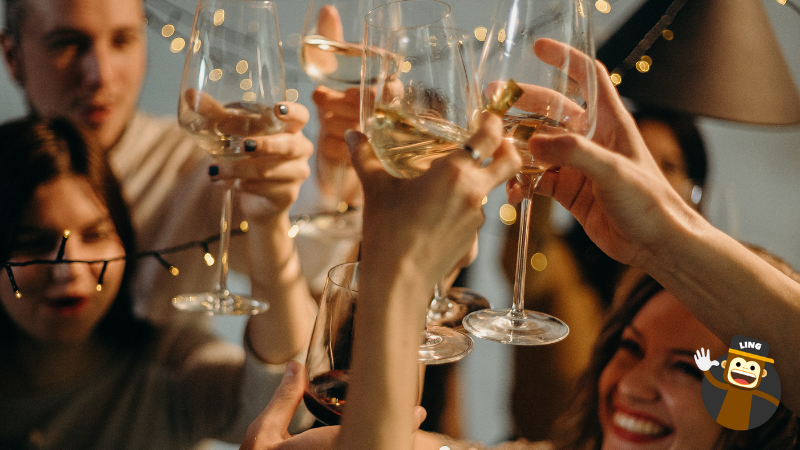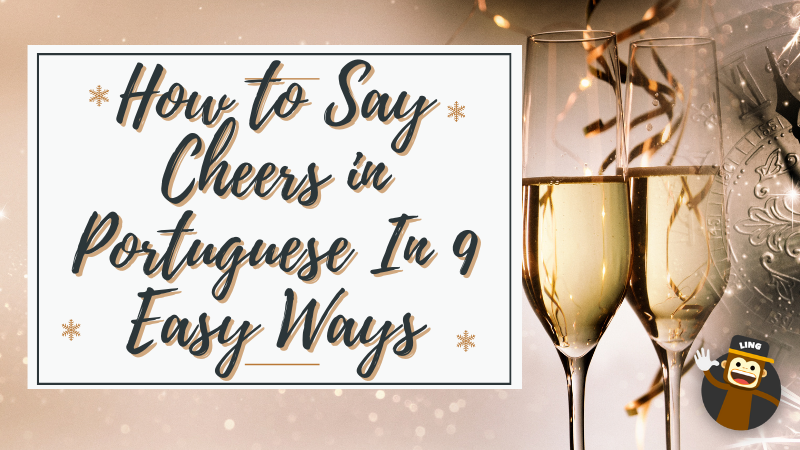Would you like to know how to say cheers in Portuguese? No matter the nationality and the language used, there is always a word that can be used to cheer and wish good health to those around us.
Portuguese makes no exception since there are several ways one can use to cheer.
How To Say Cheers In Portuguese Easily
You might have to say cheers in Portuguese if you are out drinking with your friends or celebrating special occasions. Luckily those are fun words that your friends can teach you at the moment. However, it would be even better to prepare beforehand to impress them!
Here are some examples of what you can use in such situations:
- Saúde – Literally means health
- Saúdinha – Friendly and informal way to say cheers in Portuguese
- Um abraço – One hug
- Um brinde – One toast-
- Uma saudação – A salute
- Uma boa bebida – A good drink
- Parabéns – Congratulations
- Chin-Chin– Chin chin
- À tua … – To yours …
In Portuguese, you can always use the word “Saúde” pretty much all the time to say cheers. For example, you can be more original and say something like this:
- Desejo-vos muita saúde – I wish you good health.
However, the term “saúde” can also be used in other instances. In fact, if a person is sneezing, it is common to hear others saying this word to them, which is quite common in many other cultures.
Another frequent way to say cheers is chin-chin. You might be familiar with this since it is also used in other countries. You can use chin-chin when toasting to someone or something.
If you want to use a short version or an informal way to say cheers, you can simply say :
- À tua – To yours
- À sua – To his
- À nossa – To ours
- À vossa – To yours (when addressing several individuals at the same time)
But what happens if you are invited to have dinner with native speakers? Who will begin toasting? And what are you supposed to say during that moment?
Well, let me clear that up!
Portuguese Etiquette When Drinking

Portuguese people generally say cheers while raising their glasses to the heart level. It is good manners to look at people in the eyes while clinking glasses o raising the glass.
If you are invited to have dinner, and the host wants to make a toast, you are expected to know and follow specific rules. For example, if there is wine at the dinner table, it is a tradition that the men are the ones to pour the wine, not the women.
Therefore you can expect the male host to be the one filling the glasses of the guests at the dinner table. In addition, if you are the only male at the dinner, there are good chances that you will be asked to pour the wine even if you aren’t the host. In this case, you must fill the other guests’ glasses before yours.
If you are a woman and want your glass refilled, you should signal the nearest male and ask him to pour the wine.
It goes without saying that if you are a male guest, you should always watch if your nearest female guests need a refill. Basic etiquette!
Portuguese Etiquette When Toasting
Although the glass is full, you can only start drinking alcohol or wine after the host. Then, the host will signal the guests that they can start drinking the wine by raising the glass for a toast saying “Saúde,” “Chin-chin,” “À vossa,” or similar terms.
At this point, you can also raise your glass and say cheers. Don’t forget to do it while looking at other people in the eyes. Then you should take a sip from the glass before setting it down on the table.
If you are not drinking alcohol, you can always raise the glass with the rest of the guests and place it on the table like the others without drinking.
Other Important Table Etiquette Rules To Know
Table etiquette is crucial in cultures worldwide. Following them while you are abroad will give you special advantages.
Before toasting, you might attend dinner or lunch, where you must follow and respect the local traditions.
Here are some of the rules you should keep in mind:
- First, you should wait to start eating until the host says ” bom appetite.”
- Portuguese people generally do not switch knives and forks—instead, the knives are used with the right hand and the fork with the left hand.
- If you are at the restaurant, when the meal is over, you can place them on the plate to signal the staff that you are finished with the food so they can take away the plate.
- The most important guest is sitting at the head of the table, and the most prominent guest is seated to the host’s right ( women should be sitting to the host’s right and men to the hostess’s right).
- Discussing business at the table is not a good idea unless you know the host well or are good friends.
- The bill is usually paid by the person that invited the guests.
- If you eat out in a restaurant, you must keep the 15% tip in mind.
With these etiquette tips and essential words, you can communicate with your Portuguese friends and colleagues with no problem and enjoy your time!
Would you like to know more about the Portuguese language?
Learn Portuguese Using Ling App
If you want to know more than just how to say cheers in Portuguese, then you can use an advanced, fun, and efficient tool, the Ling App!

With this interactive app, you can learn what you need to know about the Portuguese language before diving into travel and conversations with native speakers.
In fact, with Ling App you can learn more than one language simultaneously!
Ling provides valuable lessons to practice pronunciation, verbs, sentence structure, and many words to add to your daily life vocabulary.
In addition, you can count on Ling even on the go by using it through any mobile device, such as a mobile phone or tablet.
To get further tips on many aspects of the Portuguese language, read how to say Happy Birthday In Portuguese and Easy Portuguese Slang To Sound Like A Local.
Are you ready to try it out? Download the app for free on the Play Store and the Apple Store today!








